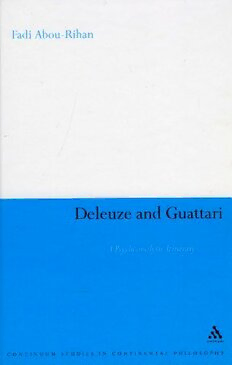
Deleuze and Guattari: A Psychoanalytic Itinerary PDF
179 Pages·2009·1.219 MB·English
Most books are stored in the elastic cloud where traffic is expensive. For this reason, we have a limit on daily download.
Preview Deleuze and Guattari: A Psychoanalytic Itinerary
Description:
Most commentators judge Deleuze and Guattari’s Anti-Oedipus as either a Medusa into whose face psychoanalysis cannot but stare and suffer the most abominable of deaths or a well-intentioned but thoroughly misguided flash in the pan. Fadi Abou-Rihan shows that, as much as it is an insightful critique of the assimilationist vein in psychoanalysis, Anti-Oedipus remains fully committed to Freud’s most singular discovery of an unconscious that is procedural and dynamic. Moreover, Abou-Rihan argues, the anti-oedipal project is a practice where the science of the unconscious is made to obey the laws it attributes to its object. The outcome is nothing short of the “becoming-unconscious” of psychoanalysis, a becoming that signals neither the repression nor the death of the practice but the transformation of its principles and procedures into those of its object. Abou-Rihan tracks this becoming alongside Nietzsche, Winnicott, Feynman, Bardi, and Cixous in order to reconfigure desire beyond the categories of subject, lack, and tragedy. Firmly grounded in continental philosophy and psychoanalytic practice, this book extends the anti-oedipal view on the unconscious in a wholly new direction. >
See more
The list of books you might like
Most books are stored in the elastic cloud where traffic is expensive. For this reason, we have a limit on daily download.
